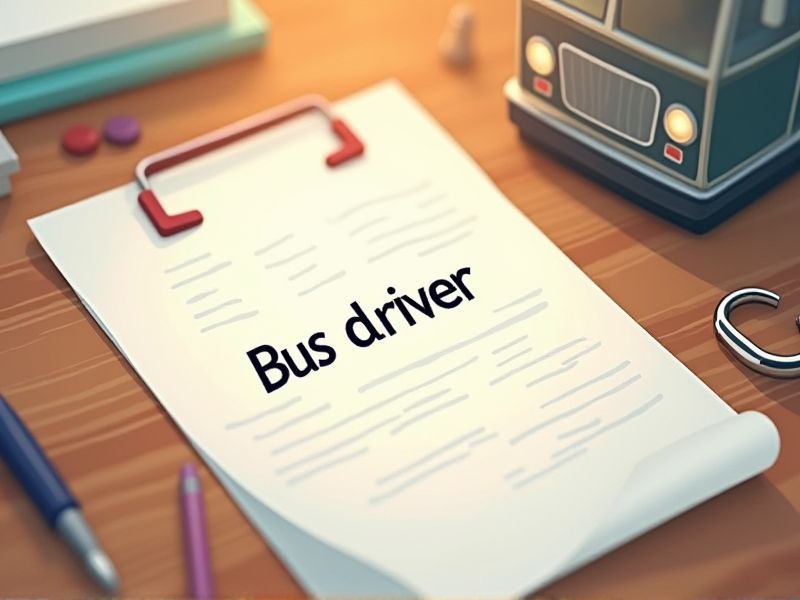
Bus drivers bear the responsibility of transporting many passengers safely, necessitating a comprehensive understanding of road safety and vehicle operation. They regularly encounter varied challenges, such as managing large vehicles in urban environments, requiring knowledge of different spatial dynamics. Certifications ensure drivers are trained to handle emergency situations and maintain passenger security. Here are vital certifications required for a career as a bus driver.
Commercial Driver's License (CDL)
The need for a Commercial Driver's License (CDL) for bus drivers ensures that drivers possess the necessary skills and knowledge for handling large vehicles safely. With a CDL, drivers meet specific state and federal regulations designed to minimize the risk of accidents on the road. This license also verifies that drivers have undergone rigorous training and testing, covering areas such as vehicle inspection, traffic laws, and passenger safety. In turn, the requirement of a CDL helps protect public safety and maintain consistent quality standards in public and commercial transportation services.
Passenger Endorsement Certification
Passenger Endorsement Certification ensures that bus drivers possess the necessary skills and knowledge to safely transport passengers. It verifies that the driver is familiar with passenger-related regulations and safety procedures, reducing the risk of accidents. The certification process typically includes background checks and training, which enhances public trust in bus transportation services. Certified drivers are better equipped to handle emergencies and passenger interactions, promoting a safer travel environment.
Medical Examiner's Certificate
The Medical Examiner's Certificate for bus drivers ensures they meet health standards to safely operate large vehicles, reducing accident risk. Federal regulations require this certification to maintain public safety on roadways. Without the certificate, there may be increased legal liabilities for transportation companies. This certification helps maintain consistent health standards across the transportation industry, ensuring driver capability.
Defensive Driving Course Certification
A defensive driving course certification for bus drivers can lead to reduced accident rates by equipping them with techniques to anticipate and react appropriately to hazards. Such certification often results in lower insurance premiums for the employer, as it demonstrates a proactive approach to mitigating risk. It also ensures compliance with local regulations that may require additional training for commercial drivers. Enhanced passenger safety and a higher standard of public service are often direct outcomes of certified defensive driving training.
First Aid/CPR Certification
Having First Aid/CPR certification equips a bus driver with essential skills to respond effectively in medical emergencies, enhancing passenger safety. An understanding of these lifesaving techniques can significantly reduce the risk of fatality in critical situations, such as a passenger experiencing cardiac arrest. Bus drivers are often the first responders due to the unique environment of their job, where timely medical intervention is crucial. Regulations in many places mandate this certification to ensure bus drivers meet safety standards and are prepared for unforeseen health crises.
HazMat Endorsement Certification
Obtaining a HazMat Endorsement Certification for a bus driver ensures compliance with federal regulations, as transporting hazardous materials demands specific safety protocols. Knowledge from this certification minimizes the risk of hazardous spills or accidents, protecting both passengers and the environment. Certification enhances a driver's qualifications, broadening employment opportunities and ensuring the bus company meets insurance requirements. Strict certification requirements result from the need to prioritize public safety and prevent potential legal repercussions.
Pre-Trip Vehicle Inspection Certification
Pre-Trip Vehicle Inspection Certification ensures bus drivers identify and rectify potential mechanical issues, reducing accident risks. A thorough inspection verifies that safety features, such as brakes and lights, function properly, enhancing passenger safety. Early detection of faults minimizes the likelihood of breakdowns, ensuring consistent service and reliability. Certification provides assurance to regulatory bodies and passengers that safety standards are met.
Road Safety Training Certification
Road safety training certification equips bus drivers with essential skills to handle challenging driving conditions, reducing accident rates. When drivers undergo standardized training, they become more familiar with safe driving practices, decreasing the likelihood of human errors. Certification ensures compliance with legal safety standards, protecting transportation companies from potential liabilities. Knowledge from these programs often contributes to improved passenger safety and enhanced public trust in bus services.
Customer Service Training Certification
Increased customer service skills in bus drivers can result in improved passenger satisfaction, which leads to higher ridership and revenue. Understanding conflict resolution techniques equips drivers to handle disputes effectively, reducing the incidence of complaints and safety issues. Knowledge from training certifications ensures drivers can communicate clearly, preventing misunderstandings and fostering a positive environment. Certification can enhance professional credibility, making drivers more valuable to employers and potentially resulting in better job opportunities.
Accessibility and Disability Awareness Certification
Understanding accessibility and disability issues is crucial for bus drivers, as it directly impacts the safety and comfort of all passengers, especially those with disabilities. Certification ensures drivers are equipped with knowledge to handle specific needs, promoting inclusivity and equitable service. This training can lead to increased customer satisfaction and trust in public transportation systems. Compliance with legal requirements regarding accessibility can prevent potential lawsuits and associated costs for transport companies.
Summary
With additional certifications, you can expect bus drivers to enhance their driving skills, ensuring safer transportation for passengers. Certifications often include training in defensive driving techniques, which can reduce accident risks. Drivers with credentials are more likely to adapt to diverse traffic scenarios efficiently. Certification may also lead to increased job satisfaction and opportunities for career advancement within the transportation industry.
